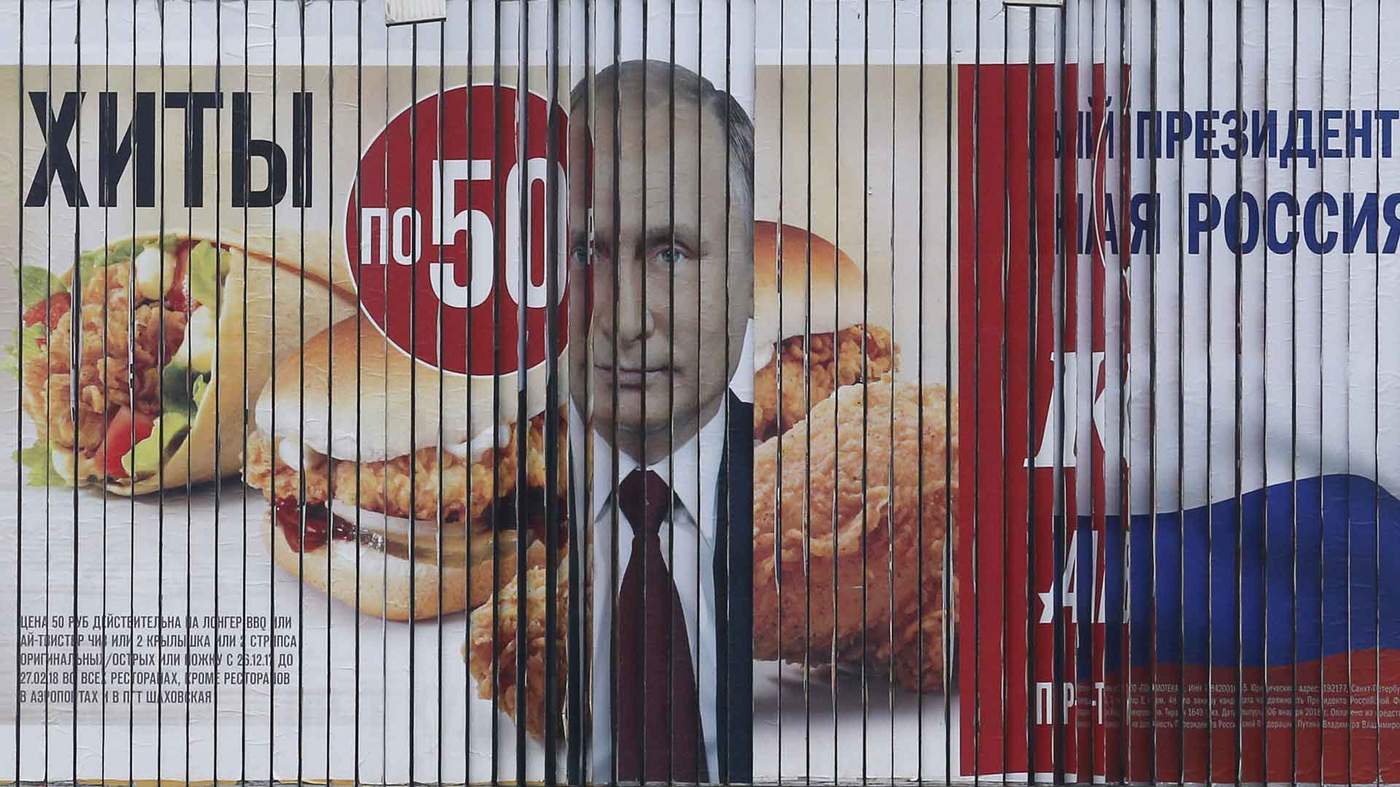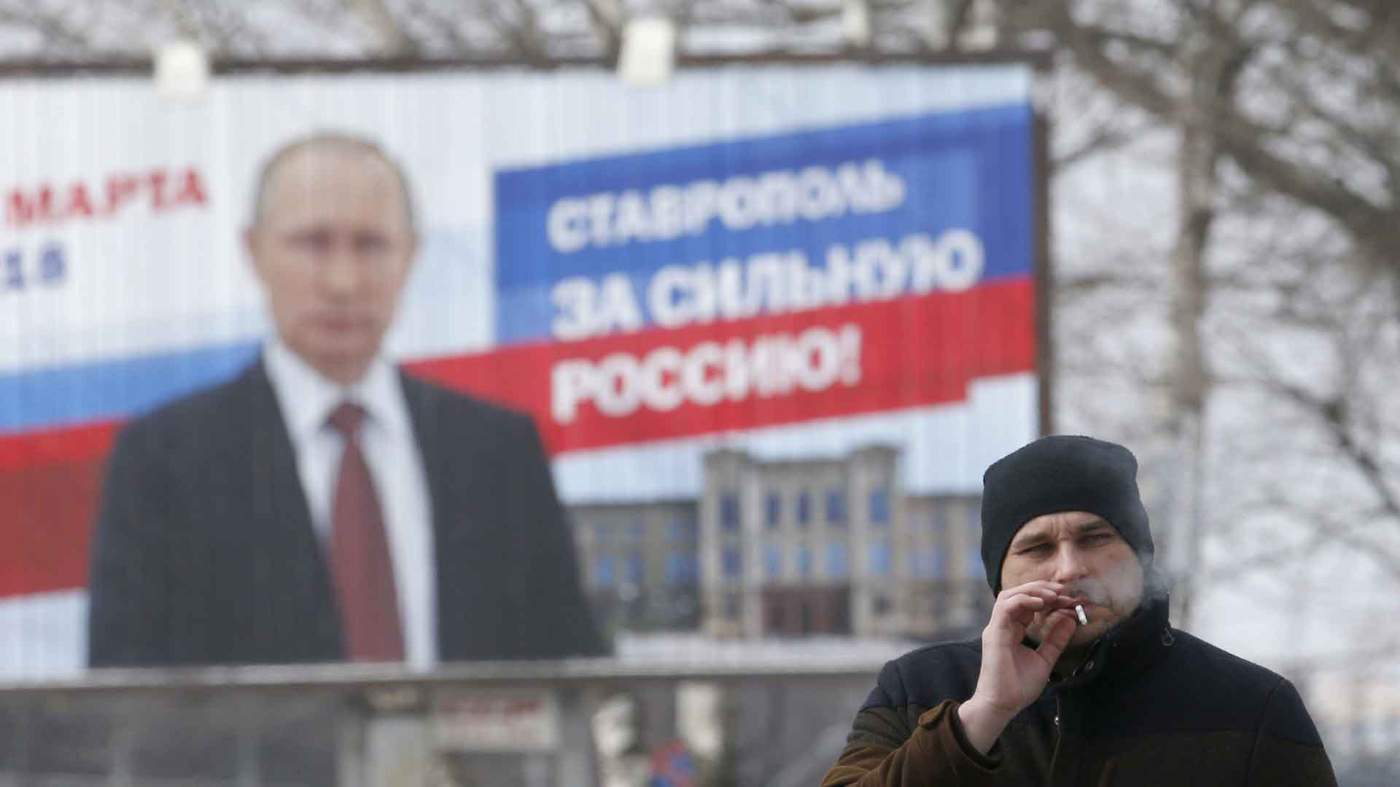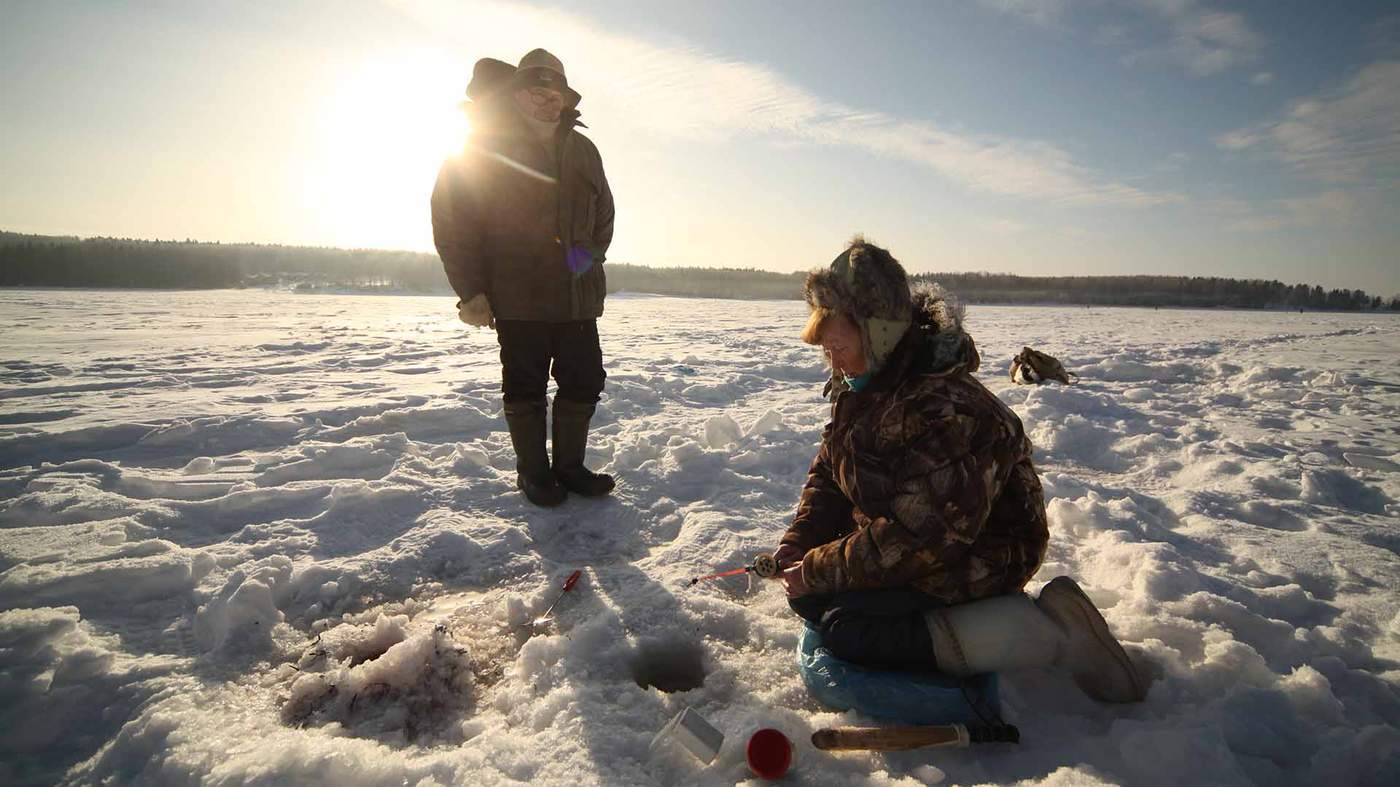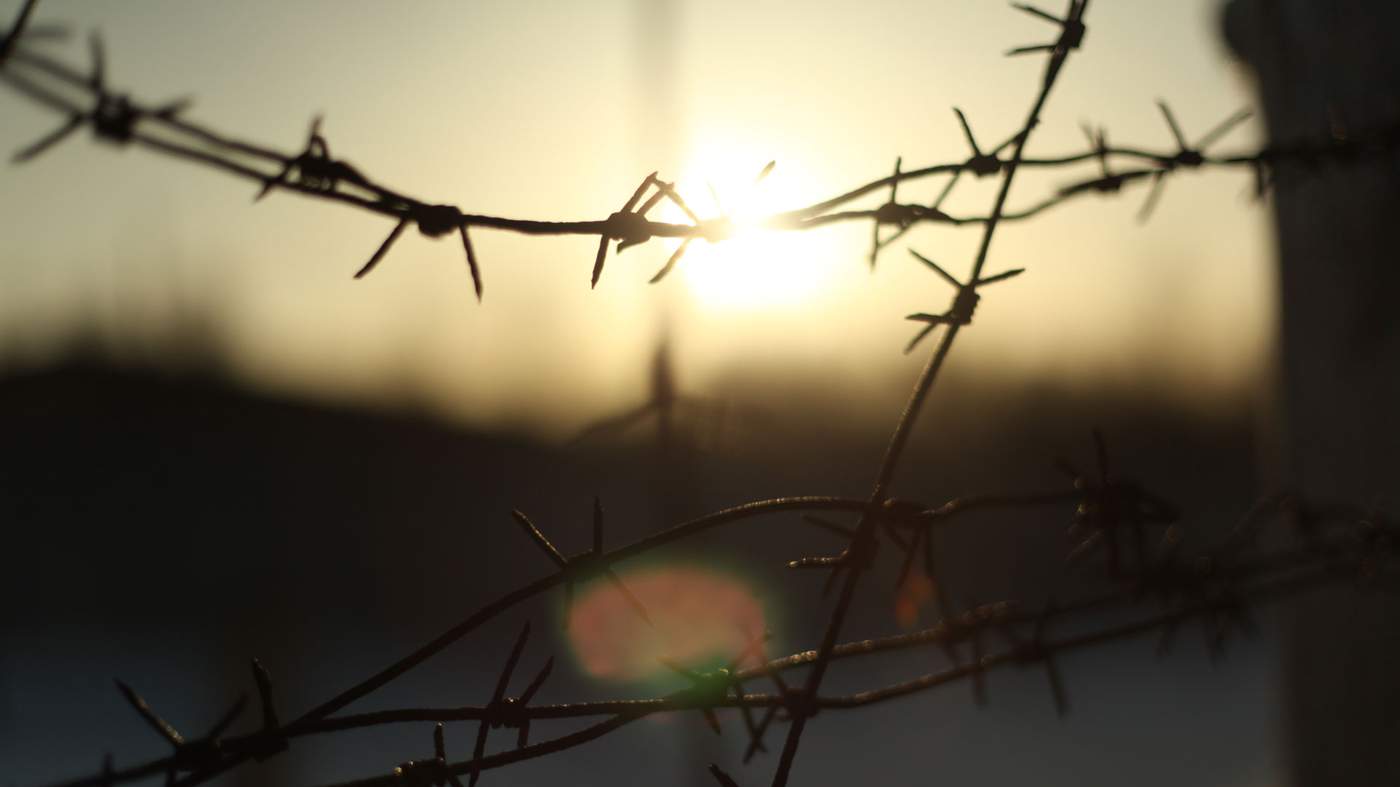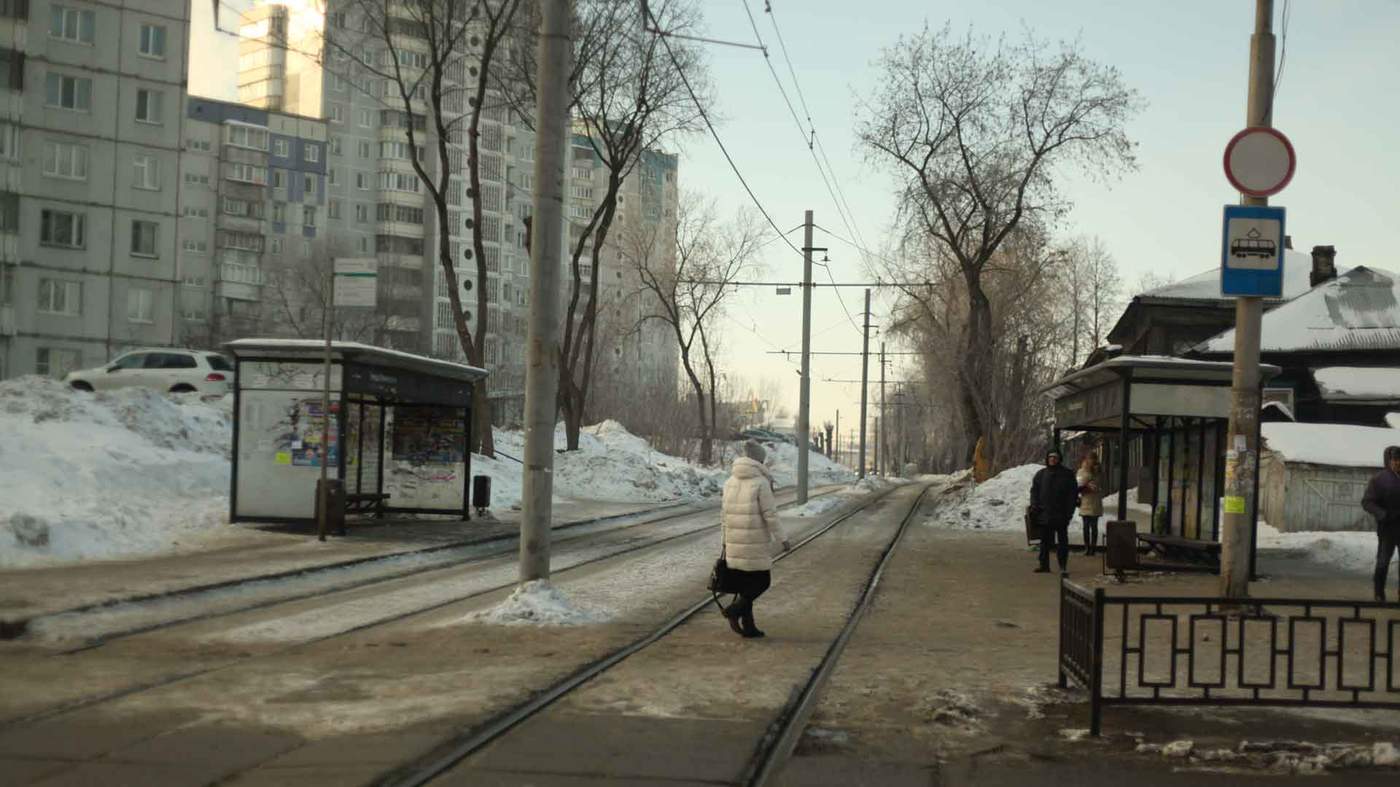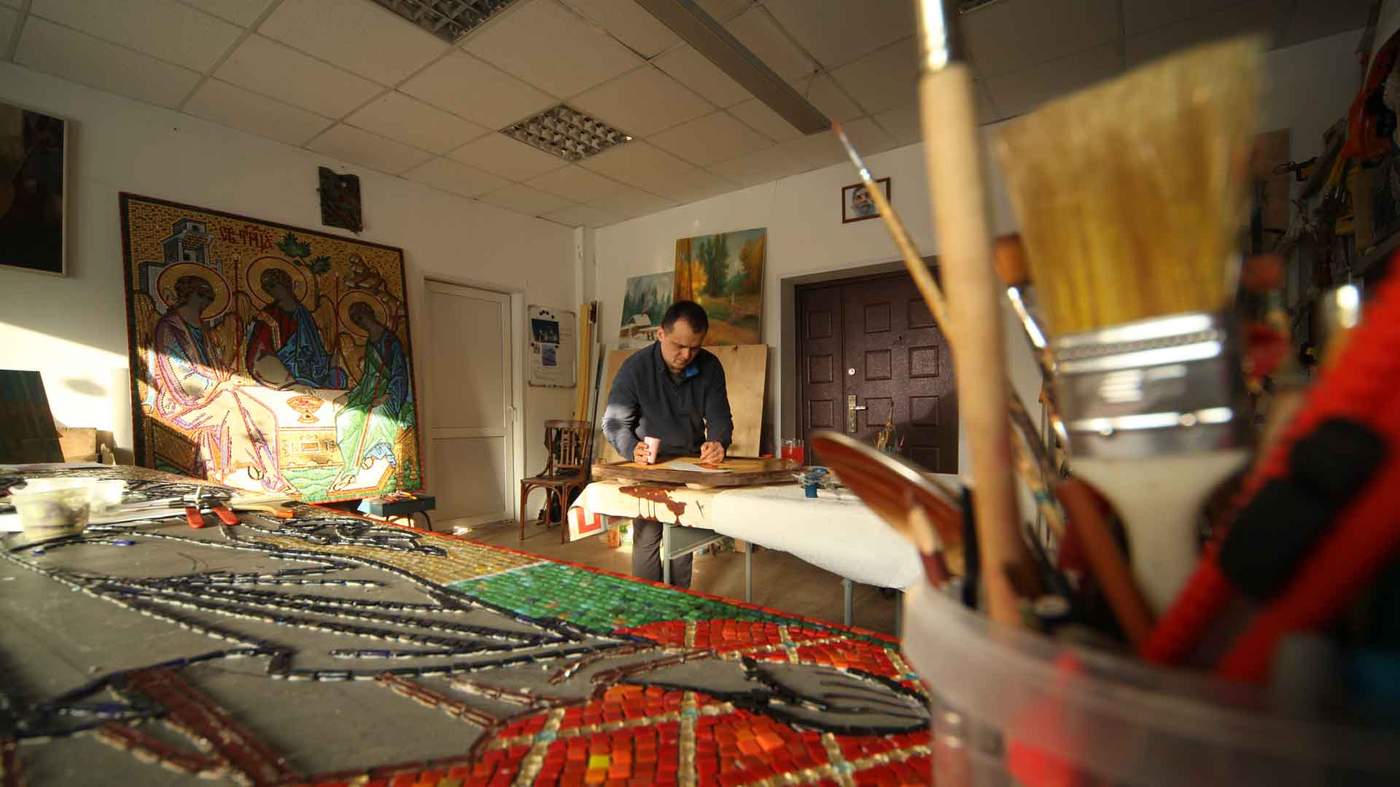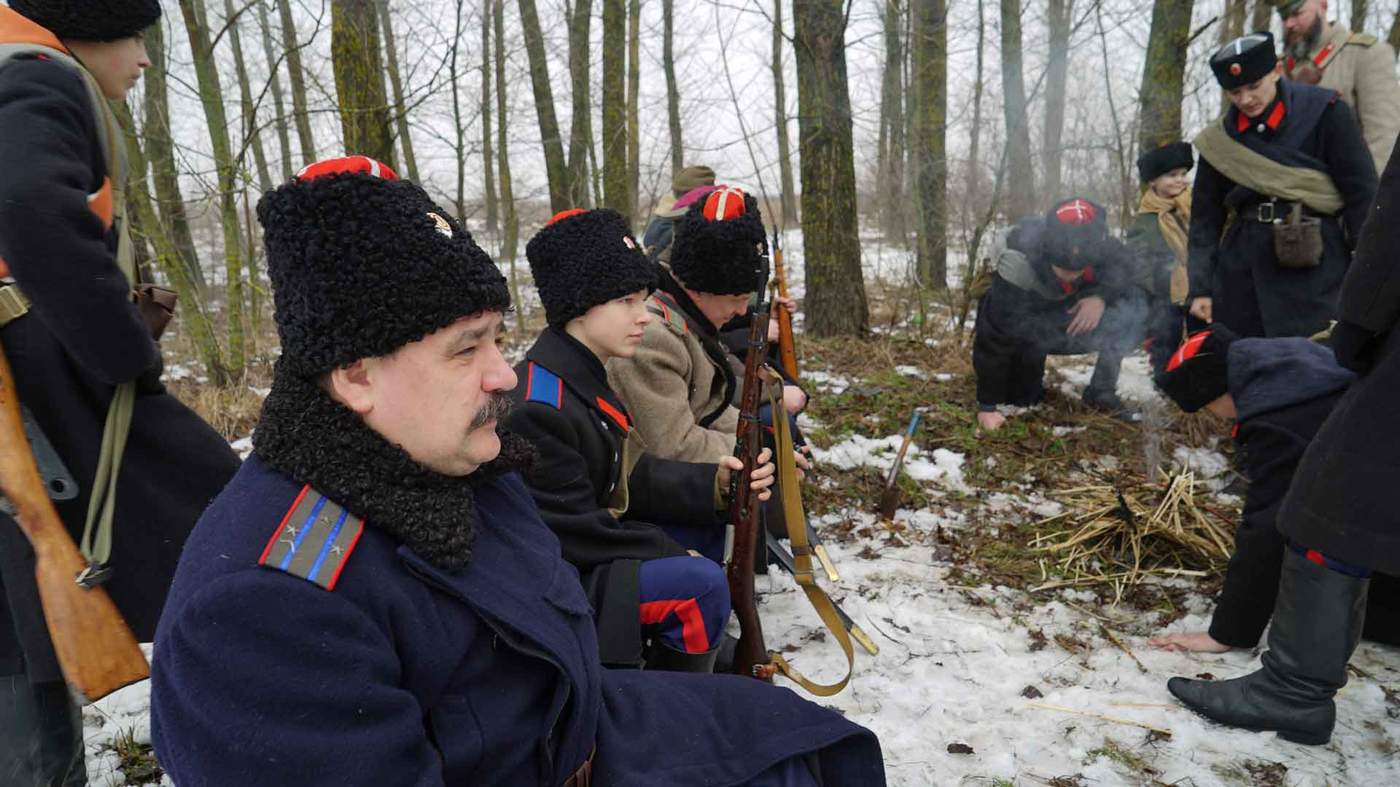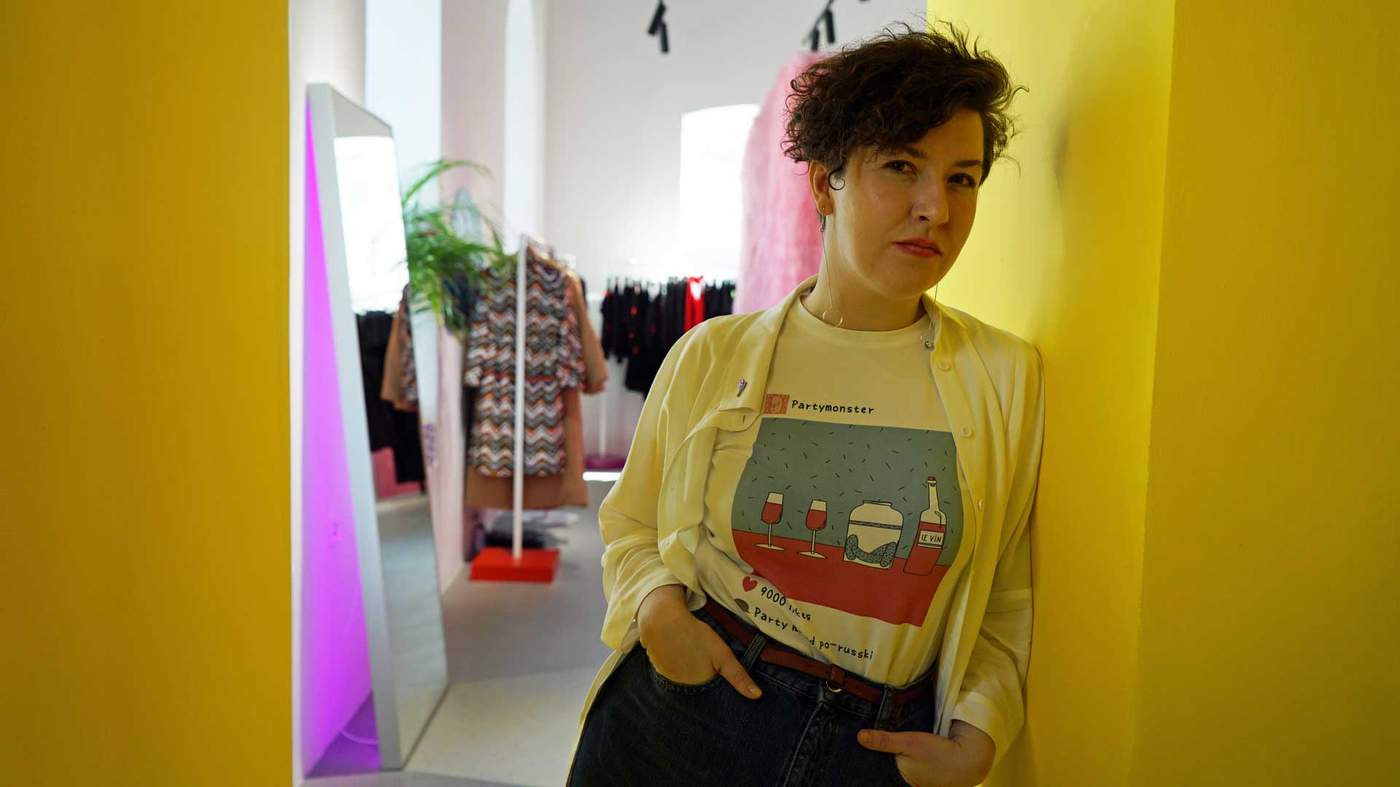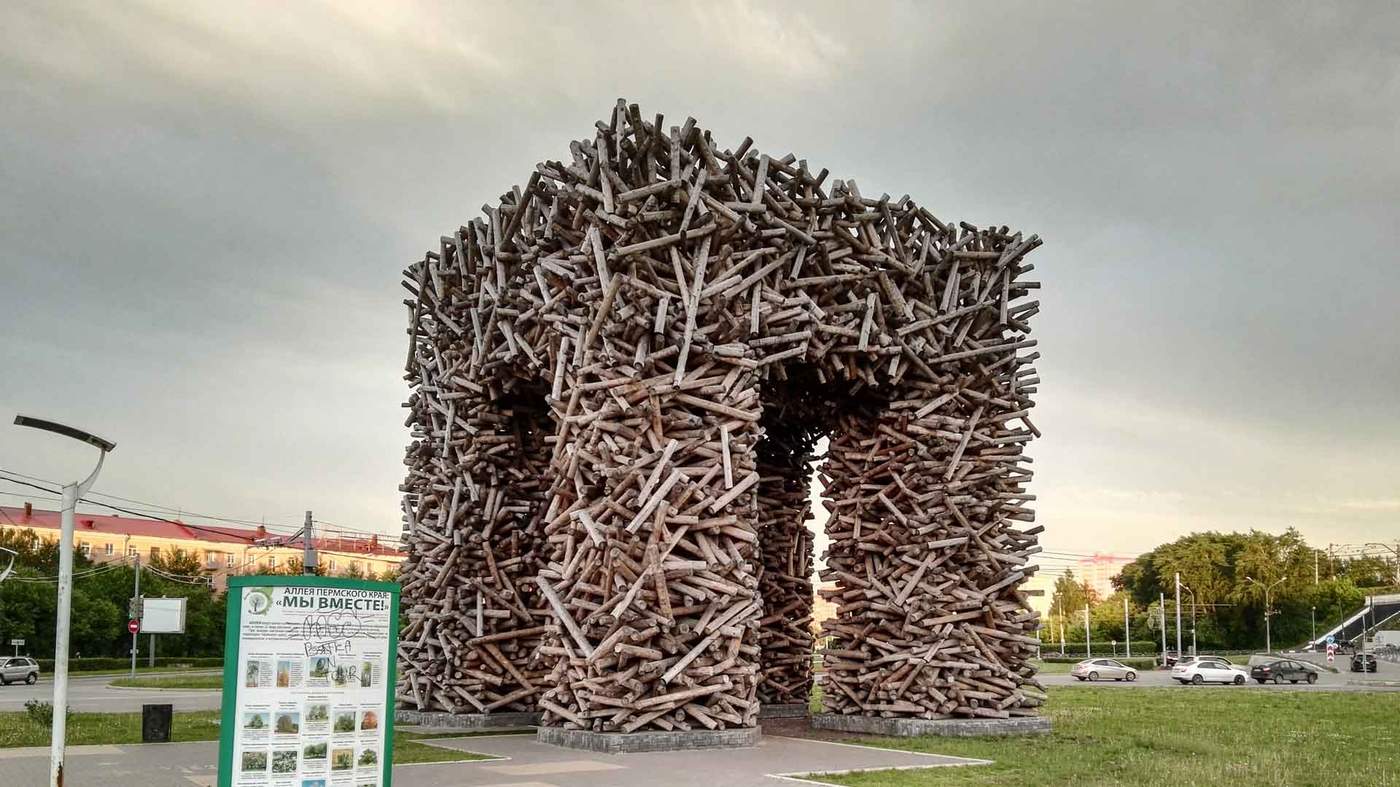The road out of Perm runs along a frozen river dotted with crouching figures. They huddle round small holes drilled through the ice. All around are thick forests of silver birch and fir trees, covered in snow.
Lyubov laughs off mention of the cold as I approach her gingerly, looking for cracks beneath my feet. It’s -17C and the pensioner has been fishing with her husband on the frozen river for hours without gloves.
“It’s fine!” she insists, dipping a finger through the ice hole and swirling it round. “It’s warmer in the water.”
Russians are famed for their hardiness. But ask about politics and there’s one fear that keeps recurring - no-one wants to return to the chaos and criminality of the 1990s. Those who lived through the Soviet collapse still shudder at the memory of the empty shops, the queues and the hardship.
In some places there was conflict - in many places there was organised crime. And everywhere there was bewilderment as an entire ideological system fell apart.
Putin, only Putin. He's our man... If someone new came we'd have to start all over again, and who knows how that would work out?"
For those who don’t remember the era, officials and the state-run media machine now constantly spread the fear of chaos. It comes with a message - President Vladimir Putin brought an end to that. He brought order and stability.
“Putin, only Putin. He’s our man,” Lyubov insists, when I ask her about Russia’s presidential election.
“If someone new came we’d have to start all over again, and who knows how that would work out? Our pensions aren’t much. But it’s enough. Things are stable.”
That message has intensified over Putin’s last six-year term in office.
At the same time, the idea that Russia faces a hostile outside world has spread. It was the West that fomented chaos in the 1990s and tried to force its ways on to Russia, Putin argues. Not satisfied with winning the Cold War, he insists that the West wanted to humiliate the former superpower.
So he has built up Russia - allowed it to feel strong again. Now, it is pushing back.
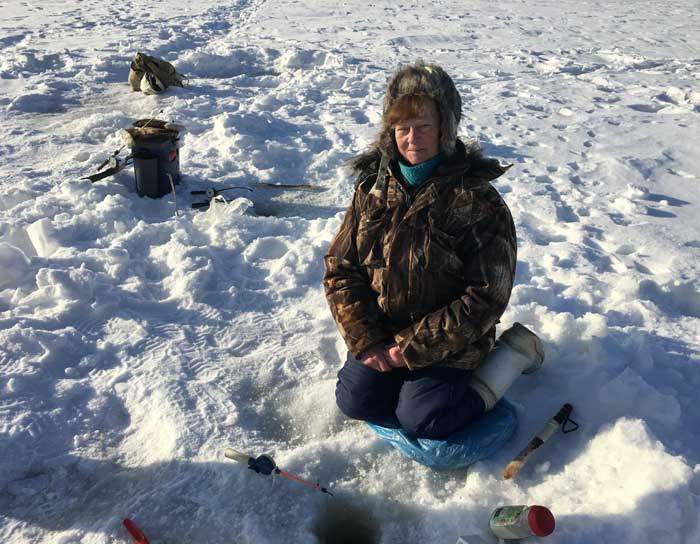
In the middle of this river, 1,200km (700 miles) east of Moscow, that message has barely filtered through. Lyubov does have a vague notion that the West doesn’t like Russia much. She mentions the doping scandal at the Olympic games that’s been reported heavily on TV, and blamed on Russophobia.
But Lyubov is not too worried. “All that will pass,” the pensioner assures me, more interested in catching a bite as she lowers her line back into the ice hole. “It’s just a question of time.”
A little further along the road out of Perm, there is a cluster of brick buildings and single-storey wooden barracks. They stand as a stubborn reminder of an uncomfortable past.
Now a museum, Perm-36 is the only part of Joseph Stalin’s Gulag that still survives.
The network of brutal labour camps was where Soviet Russia sent its political opponents, as well as many criminals and kulaks - wealthier peasants.
During Stalin’s Great Terror in the 1930s, millions passed through the system. Hard physical work on meagre rations in extreme weather killed vast numbers.
Perm-36 is a remote monument to this repression. Far east of Moscow, it has been at the heart of a dispute over history itself. It’s a controversy that hints at Russia’s priorities under President Vladimir Putin and his increasing hostility to the West.
The museum at this site was founded by historian Viktor Shmyrov in the 1990s as post-Soviet Russia opened up to the world.
“The Gulag was a huge phenomenon but there are practically no traces of it left,” he says. “That’s why Perm-36 needed preserving.”
The country opened many archives then too, revealing the scale and details of decades of political repression. But the desire to dig deep into that past has been fading.
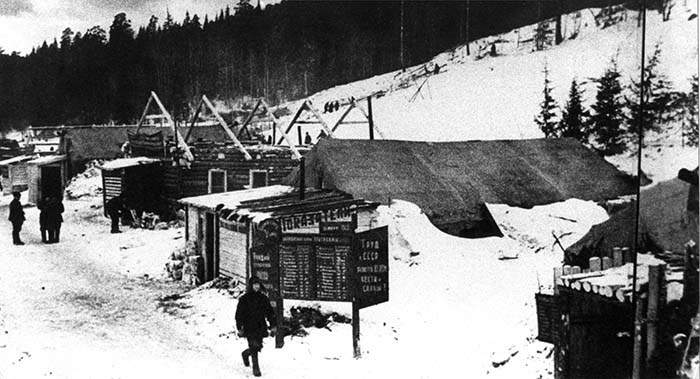
The Perm camp in the 1940s
In 2014, Perm-36 was taken over by the local authorities and the museum’s founder was removed. The new administration then tried to soften the museum’s focus, says Shmyrov.
“The dominant idea now is that the Gulag was necessary, both economically and to bring discipline and order.”
One member of the new team admits there were changes. “There was a lean towards justifying the repressions, maybe three years when the museum wavered,” historian Sergei Sheverin says, standing by rows of barbed wire.
At one point, the Gulag museum’s own website defended Stalin’s imprisonment of scientists - to force them to work for the state.
Sheverin suggests the museum was a stain on the “Great Power” narrative of Russia that’s now led by Putin. That approach has seen Stalin rehabilitated because of his role in the Soviet defeat of Nazi Germany.
“The policy from above is that we shouldn’t remember the bad things, only the good,” says Sheverin.
The museum’s founder Viktor Shmyrov suspects there was an additional reason for his removal. Perm-36 used to host an annual forum and music festival that attracted thousands. In a place where free-thinkers were once incarcerated, Shmyrov says the festival had developed into a “freedom space”.
“Not one person there could say a good thing about Vladimir Putin of course,” he says. “We used to have a powerful civil society. Now they’re bringing order and control.”
The attempts to dilute the historical message at Perm-36 sparked opposition from human rights activists and the independent press.
I was given a full tour by a management team anxious to prove that the museum endures as testimony to the crushing cruelty of the Soviet state. The tiny exercise space of the “special zone”, the rock-hard bunks and the sheer remoteness of the camp all drive home that point.
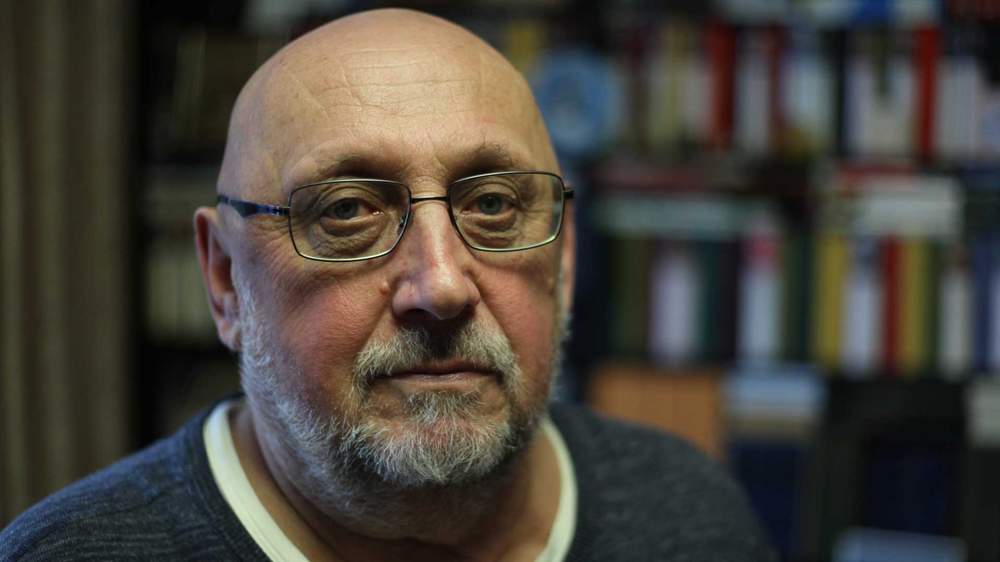
Viktor Shmyrov was removed as director of the museum he founded
But Shmyrov has not been restored to his post. Instead, the organisation he first created to run the Gulag museum has been branded a “foreign agent”. Under a law passed during Putin’s latest term in office, that label is now applied to all groups engaged in “political activity” and receiving funding from the West. In the president’s words, such groups “serve the interests of others”.
Recovering the memory of Perm-36 and its prisoners, the move implies, was an act of subversion on behalf of an enemy state.
Perm is a big city - unattractive and industrial at first glance but its appeal creeps up on you. The pale orange morning light on the city is beautiful from across the broad, sweeping river. The main avenue through the city centre is lined with Soviet architecture and decorated with elaborate ice sculptures.
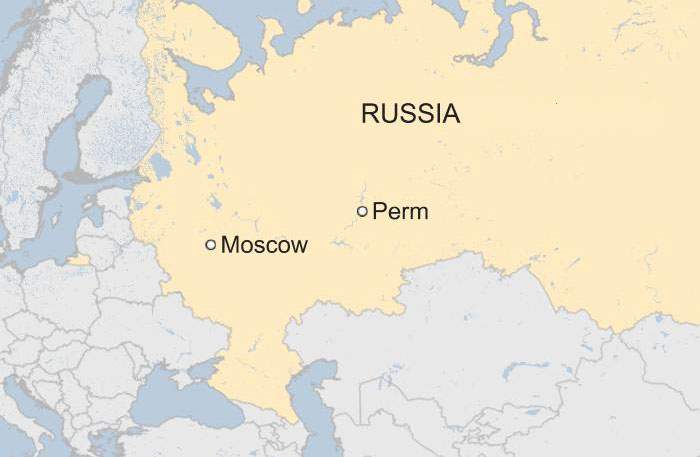
For decades Perm was a hub for military factories producing aircraft and artillery and completely closed to foreigners. Prying eyes were kept away from sensitive technology. But this city has been changing.
In the basement of an apartment block is the only gay club in Perm. Inside, the crowd are free to be themselves.
“I can be Whitney Houston, Lady Gaga… all sorts of people,” Ruslan says, in a cramped dressing room stuffed with sequined clothes and synthetic wigs.
A factory worker by day, Ruslan’s night-time transformation includes applying dramatic eye make-up in thick layers and carefully attaching false lashes. But he lives a double-life.
Emphatically “out” within the four walls of this club, above ground Ruslan keeps his sexuality under wraps.
“If you don’t make people speak openly about it, then we live absolutely fine. Happiness likes silence,” the 26-year-old says, applying black liner in dramatic swoops around his eye.
He sums up life for LGBT people in Russia. “It’s fine to be gay, but you can’t say being gay is a good thing.”
Russia decriminalised homosexuality in the early 1990s but social prejudice remains and it is fed from the top.
In 2013 a new law made it illegal to “promote” homosexuality to minors. Last summer the European Human Rights Court ruled the law discriminatory, warning that it encouraged homophobia.
Public figures regularly present gay rights as an alien concept, forced on Russia by the degenerate West. The term “gay pride” is now uttered by some with a sneer, as an insult.
Perhaps it’s not surprising then that Ruslan isn’t campaigning for more freedom. His own parallel lives are just part of what he calls the “Russian reality”.
“The borders are open,” Ruslan says. “If you really want to walk hand-in-hand with your boyfriend in the street and kiss so everyone claps, then you’re welcome. Go for it. You can buy a ticket and travel. It’s not the USSR.”
Moments later, fully transformed into “Kira Cocaine”, he struts on to stage in high heels and long purple wig, to lip-sync to Russian pop. The small crowd roar their approval from the dancefloor and “Kira” starts up a comic, crude banter.
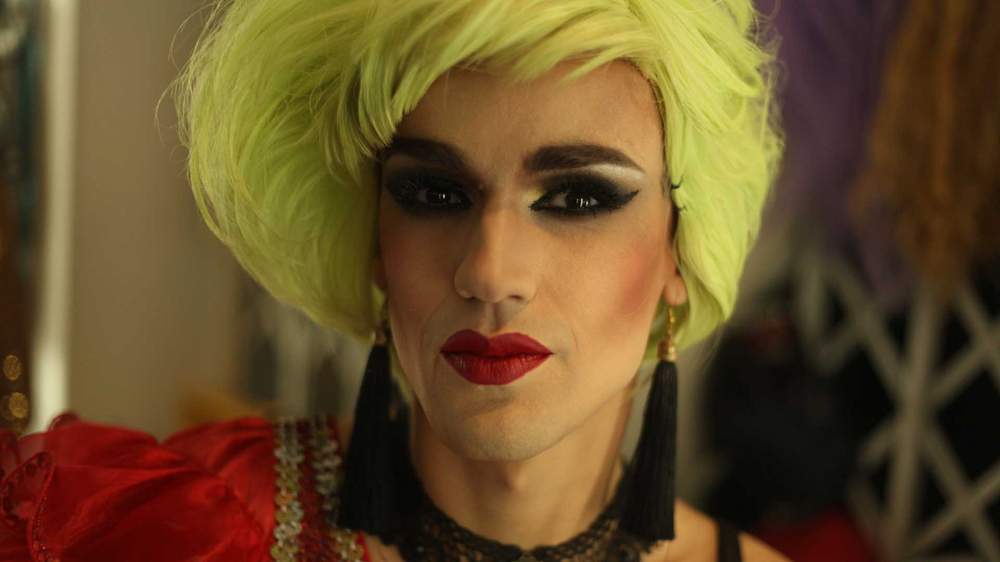
Outside a group of clubbers stand smoking by the door, defying the cold. This is a spot where they feel safe and uninhibited. Beyond the grey metal gate, that freedom is limited.
At Perm’s only LGBT support group, members say the law against “gay propaganda” has made life harder.
About 15 people have turned up for a weekly discussion. The topic this time is famous gay figures in history, and afterwards the group talk about taking strength from the reminder that they’re not alone. Among them are several psychologists who work with the centre to offer counselling.
They don’t want the group’s location revealed. There is no sign on the door. “In this climate, that’s impossible,” says one woman.
The propaganda law has particularly complicated life for those working in education. One of the young women in the group describes panic when it passed, a fear that even saying the word “gay” could get you fined thousands of roubles. Another says people think homosexuality is a “disease which can be passed on”.
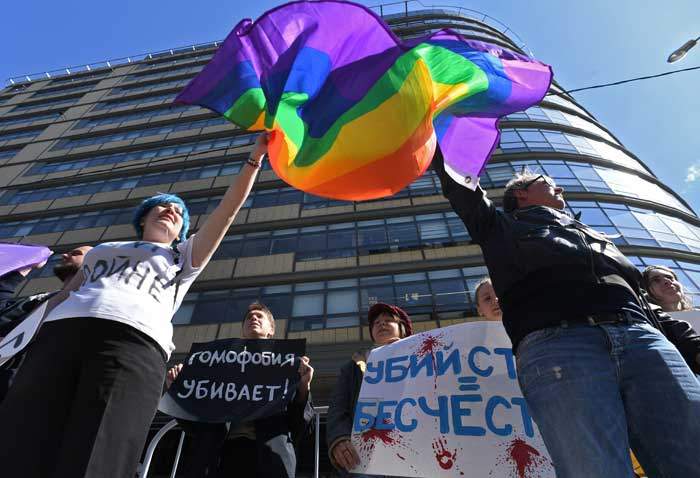
A gay rights protest in Moscow, June 2017
A trainee teacher reveals that she masks her sexuality on social media so her students won’t realise. “I portray myself as straight and I have a male friend who I post pictures with, like we’re a couple,” she admits. “That way I can’t be accused of propaganda.”
The atmosphere in the room is warm and relaxed - it is decked out with rainbow flags and leaflets. But security cameras on the walls are a reminder of a shattering day. Two years ago - at a previous premises - the centre was raided by more than a dozen police. They came to check the group’s activity was in line with the propaganda law.
“It was humiliating,” a woman who was there says quietly, asking not to be named. “They treated us like we were an illegal group. Here we help people through complex situations. We think society needs us. But to them we are scum.”
After the police raid they were kicked out of their building - the landlady said she didn’t agree with homosexuality. The group now exists only on donations, unable to apply for Western grants because that means being branded a “foreign agent”. The foreign agents law, like the gay propaganda bill, was signed by President Putin during his most recent term.
Last May, the Perm LGBT group made a small step forward when they got permission for a public gathering on international anti-homophobia day. Some 30 people with rainbow balloons were guarded by 20 police. Their hope is to build on that and emerge slowly from the shadows.
Things are tolerable now - that means they don’t kill us”
When I visit Nadia at the flat she’s been sharing with Masha for two years, she tells me she’d love to live openly like she’s heard is possible in Europe. “I’d love for being gay to be as natural as any other relationship,” she says. But here, deep in the Russian provinces, few want to risk pushing for that.
“Things are tolerable now. That means they don’t kill us,” Nadia puts it bluntly. “I would say that people don’t know [our sexuality], so they don’t attack. Everyone puts all their efforts into no-one finding out - and that’s where it stops.’
Over the river, deep in the countryside, Igor Dymahakov and his family have moved outside Perm to live a “traditional” Russian way of life.
They came to the village of Ilyinsky after Igor received a commission from the local museum. A painter of Orthodox Christian icons, his garage is filled with works-in-progress including a giant mosaic propped up against the wall.
A ray of winter sun cuts in through a small window as Igor works, his bold brushstrokes colouring the cape of a saint bright red.
The family’s two-storey wooden house is cosy thanks to a log-burning stove. In the kitchen, Olga has prepared a huge heap of pancakes. The youngest of four children dart in and out as she sets the table. In the next room the others watch cartoons beneath a giant painted image of an angel.
Before they sit down to eat the family sing a solemn “Our Father” led by Igor, facing an icon mounted on the wall.
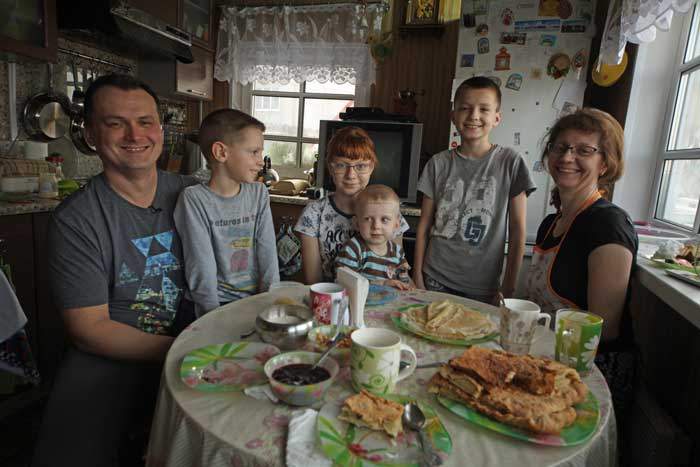
Igor and Olga with their children
Igor and Olga both discovered religion after the atheist USSR fell apart. They describe themselves as children of Perestroika, the dramatic political transformation that precipitated the collapse of decades of communist rule.
It was a period that brought many positive changes. “We could converse freely with foreigners, for one,” Igor tells me. But they also remember a sudden cascade of corrupting influences.
“The iron curtain should have been opened more carefully,” Igor argues, sipping a mug of tea around the family’s kitchen table. “Soviet people weren’t ready for the stream of things that hit us.
“There was a flood of erotica, horror films and all sorts of rubbish. An uncontrolled tide.”
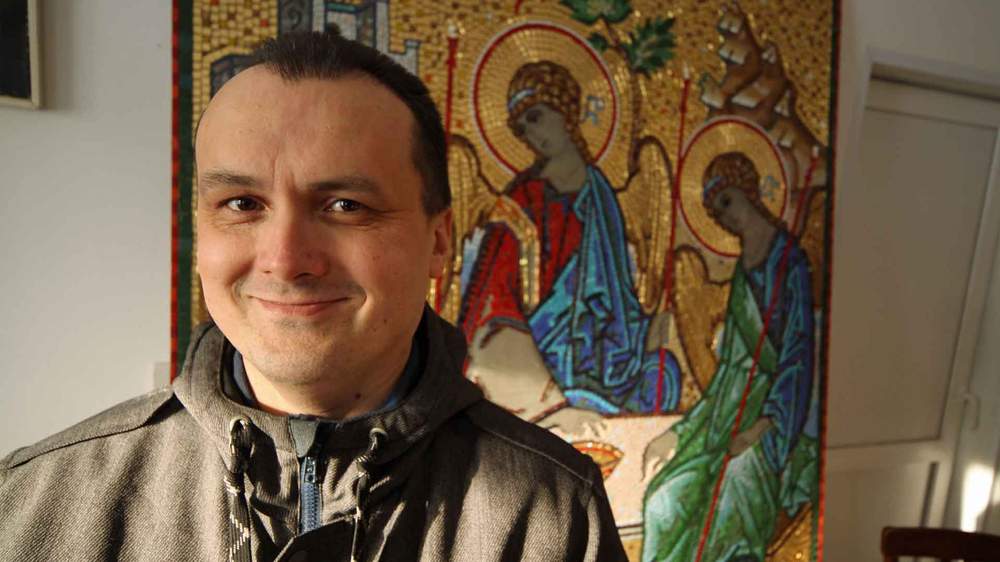
Igor Dymahakov: “The iron curtain should have been opened more carefully”
Igor says some of his generation couldn’t cope with the assault. His own choice has been a very deliberate turn to tradition. In his terms, it’s a turn towards Russian Orthodox values, away from the corrupting influences of the West.
Igor is not alone in his conservativism. There’s a new trend for the traditional. A former KGB spy, Vladimir Putin has undergone his own transformation in power. He now styles himself as religious and refers to “Russian values” on a regular basis.
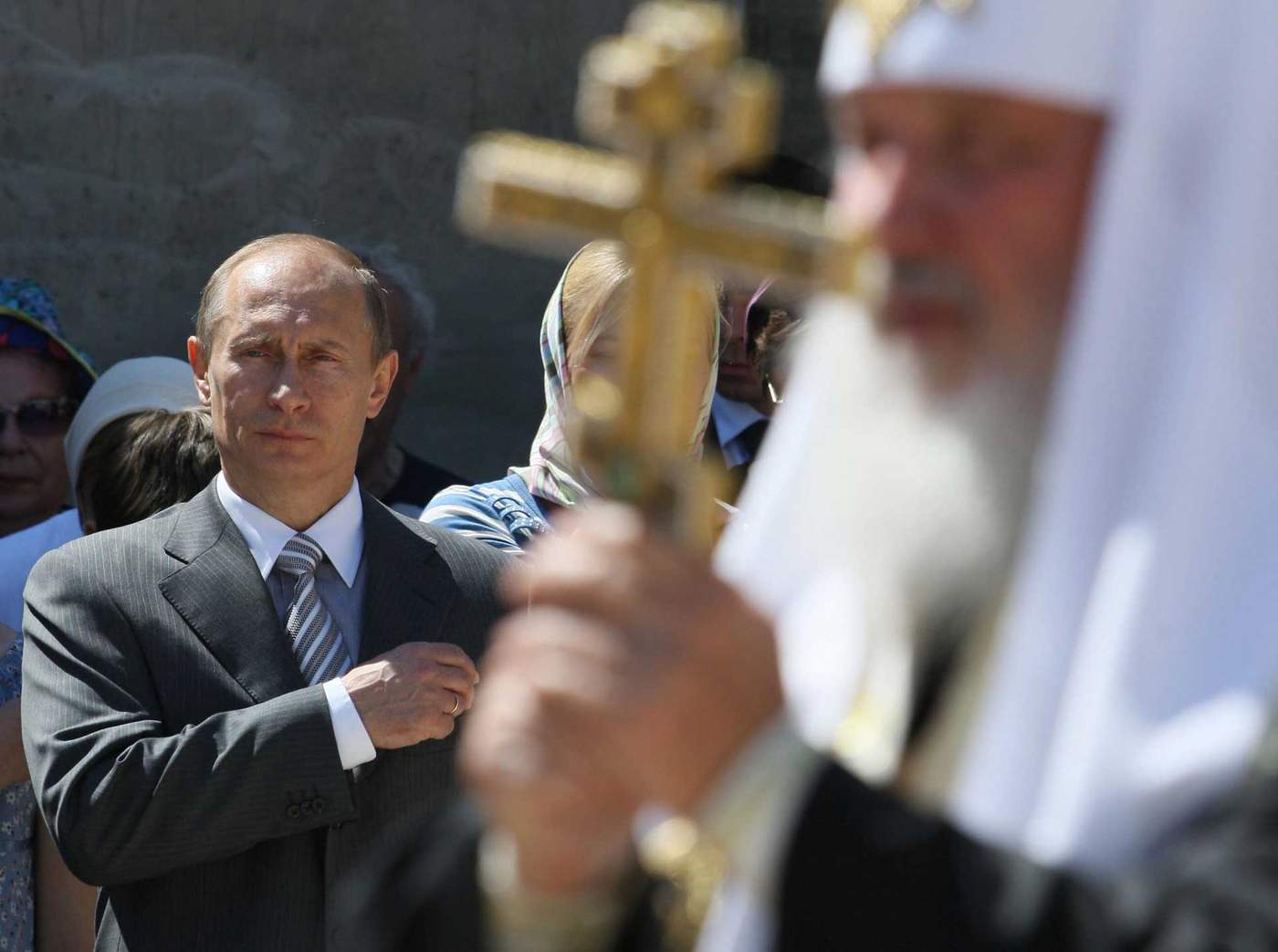
Putin also places great stress on the institution of the family as key to boosting Russia’s population. He has previously justified the gay propaganda law, arguing that it’s based on the idea that same-sex couples “don’t produce children”. Russia, Putin has stressed, needs “proper” families and more children.
Igor and Olga are not hostile to the outside world and talk warmly of guests who’ve visited in the past from America. Igor also says he doesn’t buy what state-run TV pumps into his kitchen every day - the message that the West is Russia’s sworn ideological enemy again.
“They’re just following orders,” Igor laughs. “It’s political games. It’s not serious, and it will pass.”
But Igor does believe that the decline of religion in the West has led to a broader moral slide, which he doesn’t want Russia to repeat.
“Unfortunately, things are moving away from traditional Christian values. It’s happening slowly, but steadily,” he argues. Same-sex relationships are among the things he doesn’t approve of. “There’s a rejection of traditional family relationships. Fewer people are having children. But we are resisting this,” he says, referring to his own family of six.
As evening falls over the village, the family prepare for mass. The local church was turned over to cheese production in Soviet times but it’s open for worship again and the congregation has been growing.
“Obviously after 70 years of godlessness it’s difficult for people to return to religion,” Olga admits. “But there is progress and that’s great.”
There’s pop music playing on the street opposite and a few hardy souls skating on an outdoor rink. The church itself is boxy, missing both its original cupolas and bell tower. Inside the bitterly cold entrance a few pictures taped to the walls show the place in its pre-Soviet glory.
Mass-goers now squeeze into a small section of the building that's been separated off and heated. The light inside is dim and the flames of the thin yellow candles waver each time the door opens. There’s a fair few children.
As I slip out and leave Igor’s family to the long service, he follows to explain how they hope to restore the whole church for worship one day. The parishioners have already begun gathering funds but, looking around, that seems a giant task.
More than 2,000km (1,250 miles) away in the southern city of Rostov another conservative Russian force is enjoying a revival. In the thick morning mist outside the town what looks like a Cossack army is in action.
The warriors appear in traditional baggy trousers, big boots and greatcoats, some thundering by on horseback, others marching through the melting ice and thick, squelching mud.
They’re re-enactors - reliving a moment from history in a borderland their ancestors have defended for centuries. As the Cossacks charge, roaring, towards the Red Army line there are loud cannon booms, fireworks and explosions. A horse slips and tumbles, “victims” slump to the floor. The Cossacks push on to victory.
Many on the battlefield are young cadets from local Cossack schools. Their military-style education has become increasingly popular, an ideal match for the patriotism, religion and “traditional” values that are now promoted in Russia.
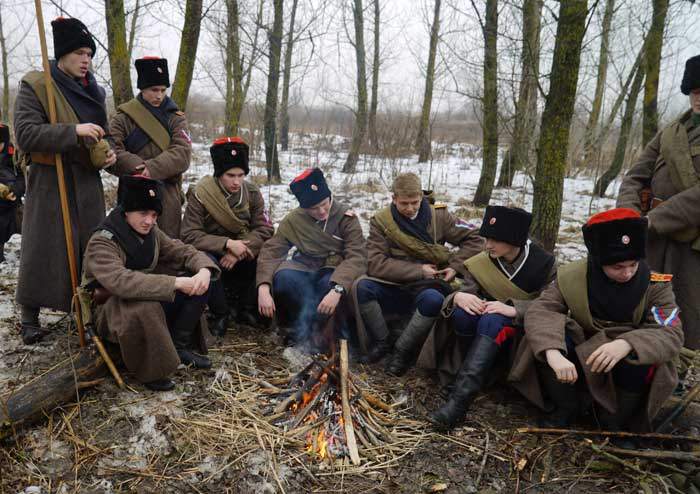
“Cossacks want to serve their country and to protect their land. That’s important. And to raise our children as defenders,” says Vitaly Babulchinko. A cadet school headmaster in real life, he’s playing a military commander on the battlefield.
As the Cossacks celebrate, I chat to some of the cadets near the smoking cannons. Cheeks still red from the fight, they tell me they plan to become officers in the Russian army one day. “Of course we’re patriotic, we’re cadets,” one says, taken aback. “Loving and defending your country is the most important thing.”
Their headmaster talks about how the boys learn ballroom dancing as well as battle skills. They also have a Cossack choir, complete with patriotic repertoire.
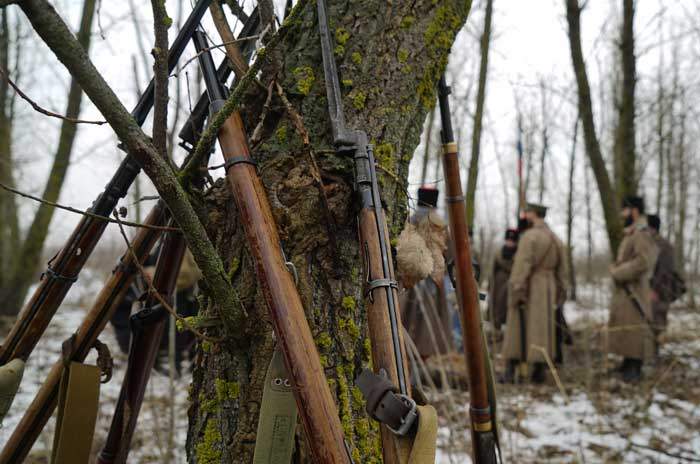
So what do these proud young Russians - who’ve only ever known Vladimir Putin in power - make of the hostility between their country and the West? All three boys look genuinely confused by the question. “For me, what happens in my own country is more important,” says Roman. “We don’t really have any negative thoughts about the West.”
But just down the road from Rostov is the border with Ukraine, where a conflict is still being waged despite an official ceasefire. The West blames Russian aggression - Russia blames Western meddling.
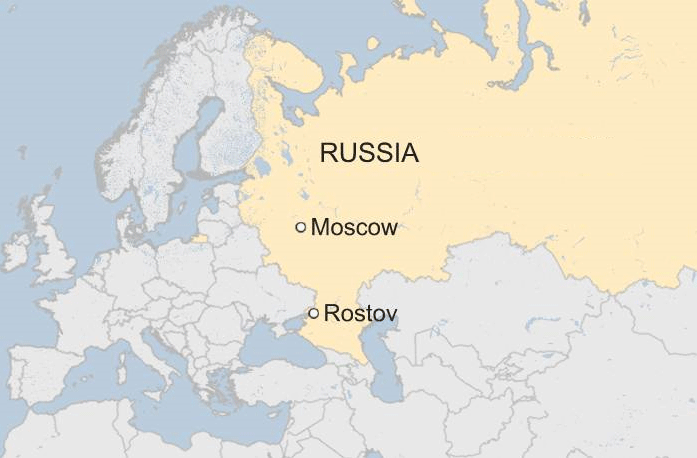
Almost four years ago, a mix of “warrior” spirit and patriotism drove some Cossacks to join the fight there. But according to one former volunteer, people of all kinds travelled from across the country.
Alexander Rostovsky sits in the office of NOD, the right-wing organisation he belongs to. There’s an array of flags and a photo of Vladimir Putin prominent on the wall. One of the group starts wiping the whiteboard when he catches me looking and three words the group appear to have been discussing - liberalism, tolerance and democracy - disappear.
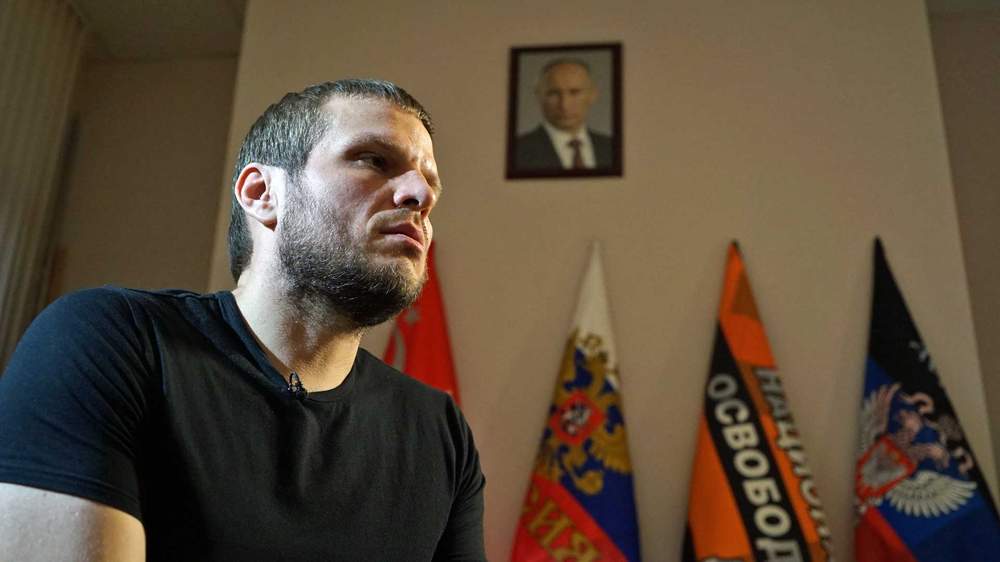
Alexander Rostovsky sees the West as Russia's oppressor
Alexander then launches into a long attack against the West. He calls it a parasite that destroyed the Soviet Union, fed off the spoils, and tried to humiliate and subjugate Russia in the 1990s. He sees what happened in Ukraine as a continuation of that campaign - a Western-backed coup that led to civil war.
“Volunteer fighters felt they had to take part in the war because if they didn’t, then their towns would be shelled next,” he says. “We remember Iraq and Afghanistan. We know who this is done by. It’s the West that wants to divide up our country.”
Such views would once have been dismissed as extreme but over the past few years they’ve merged into the mainstream in Russia, pushed by senior officials and state television.
It’s a key reason why many Russians did head to eastern Ukraine as volunteers - I met some during the conflict.
Russia has never admitted sending regular troops over the border, despite a wealth of evidence. But Rostov now has a permanent memorial to those who died. A tall, thin column in a city park topped with a cross is marked to the “heroes” of eastern Ukraine. At its base is a soggy bunch of flowers.
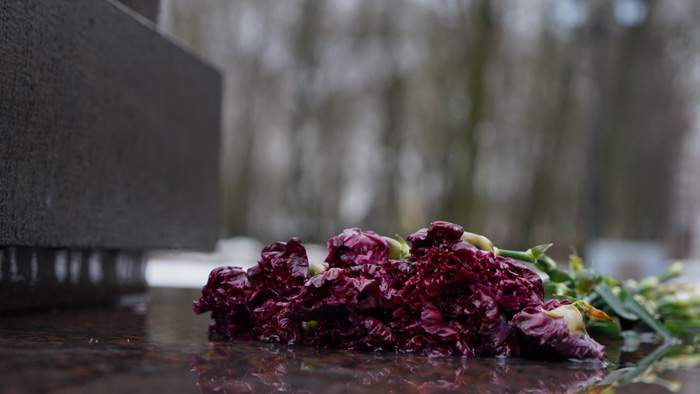
Wandering down one of the main shopping streets in Rostov, all the hostile talk seems very remote. The city boasts a brand new football stadium that will host World Cup matches this summer. Every night it lights up on the river bank as a reminder of that prospect.
In the city centre, as in much of Russia, Rostov feels more Western than ever - full of foreign stores and styles. It also has a cluster of fashionable new businesses that wouldn’t look out of place in London or New York. There’s coffee and craft beer, a vegan café and a noodle bar, and in one slightly run-down street is a women’s clothes shop with a huge fluffy pink cabin as a changing room.
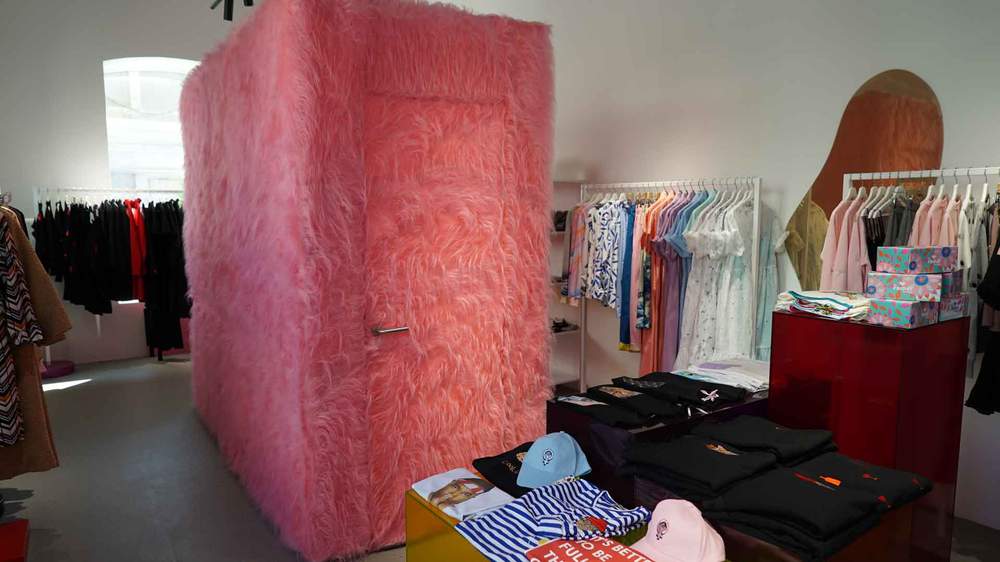
The creative force behind Like Shop is 35-year-old Maria Alandarenko. In 2012 she and her partner began selling lines by little-known designers from Korea. By 2013 they were producing their own designs in Rostov, for sale both in-store and online.
Maria says her business has been squeezed as the Russian economy has faltered under the strain of falling oil prices and Western sanctions. The cost of imported fabric has shot up, just as her customers’ spending power has tumbled.
“Before, people would drop in and buy a whole set of clothes just on a whim,” the businesswoman explains, as a couple of lunchtime browsers flick through rails hung with dramatically colourful designs. “Now people ask about discounts all the time, and we feel the impact.”
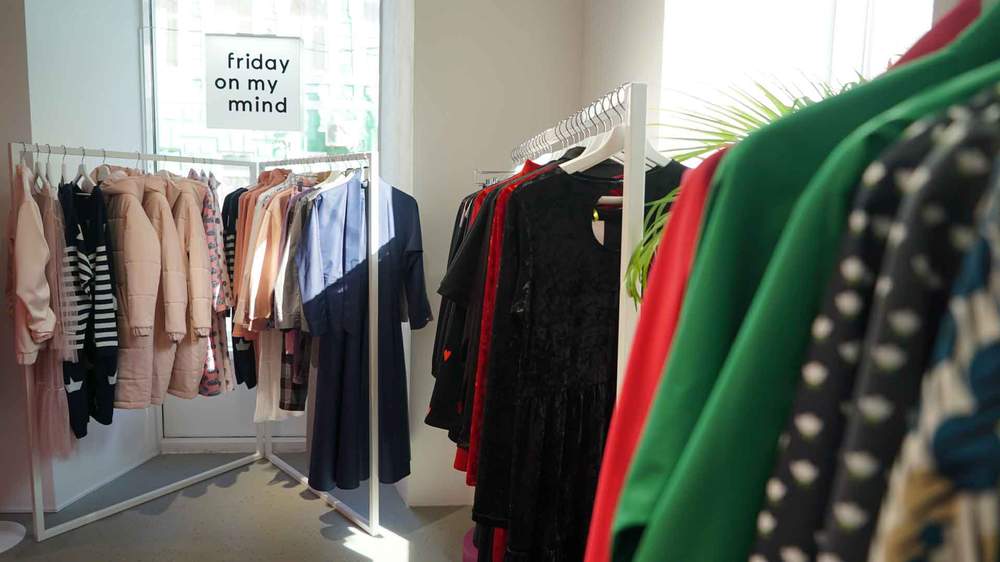
Unlike many Russians, Maria makes a direct link between the downturn and her country’s politics.
“The government is doing everything possible to isolate Russia. It’s a very sad fact.”
Full of infectious energy and enthusiasm, Maria is optimistic about expanding sales to the West and seeking new online platforms. But she’s pessimistic about another six years living under Vladimir Putin.
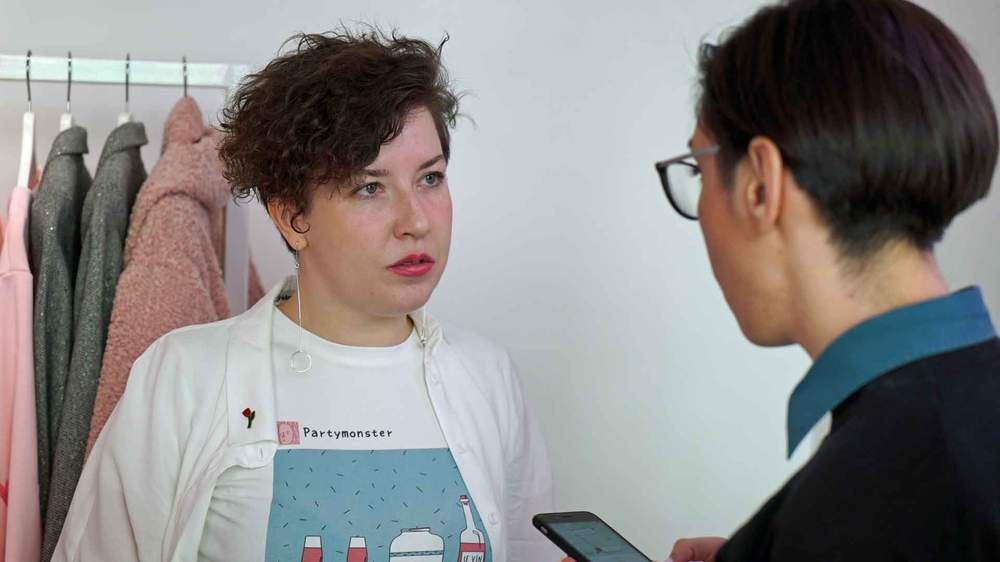
Maria (left)
Taming the media was one of the president’s priorities, very soon after coming to power, and it has had a long-lasting impact.
“Instead of talking about problems we have inside the country, they talk about how we are surrounded by enemies who all want the worst for us,” says Maria of the television news.
“It's really scary, because it whips everything up. People then think we need to push back, otherwise we'll be overrun and destroyed.”
Across the road from her clothes store, Maria and her partners recently opened a wine bar. In the evening, a young after-work crowd sip from large glasses of European wine and tap on smartphones. Among them are theatre directors, art curators and a couple who run a comic shop.
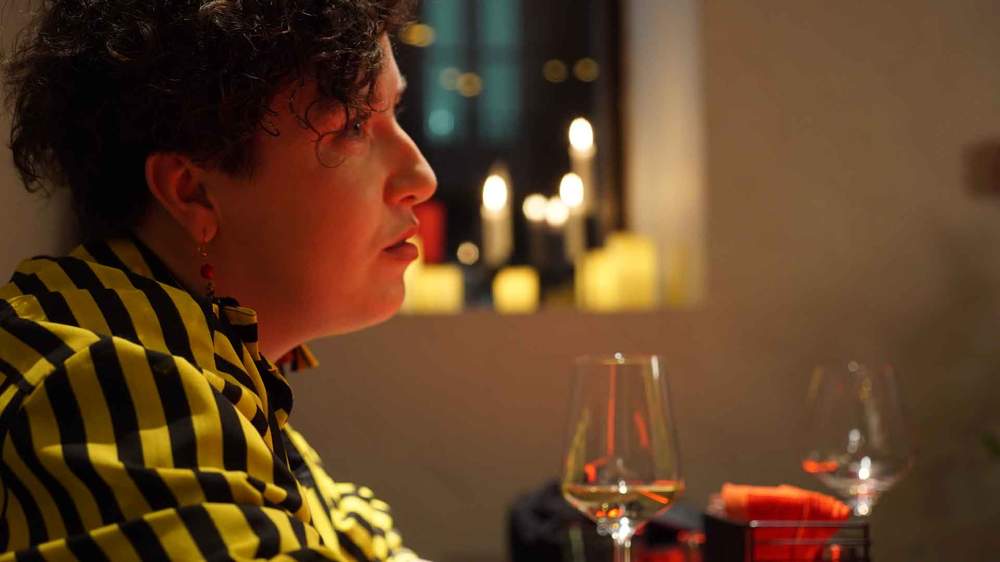
Like Maria, and unlike their president, they don’t look on the West as a threat or an enemy. It’s somewhere they travel to and trade with. For Maria, it’s something more. “We have a European mentality and we are European,” she says, adding that no-one “normal” would think fair elections, stable institutions and an active civil society were bad.
“I like to think there are European values that Russians share, inside themselves.”
In the eastern city of Perm there’s a giant archway - made of driftwood and shaped like a Russian letter P.
The massive sculpture was part of the city’s attempt to rebrand itself as progressive. It proved controversial. “People tried to torch it when it first appeared,” the taxi driver says as we drive past.
A “cultural revolution” started in Perm in 2008, with the city pitching itself as a capital of culture not just for Russia, but for the world. The once closed-off military city was embracing modernity and the West.
The ambitious project was launched during a brief liberal “spring” when Dmitry Medvedev took over the presidency. The constitution barred Vladimir Putin from running for a third consecutive term so Medvedev kept his seat warm.
The governor in Perm was a liberal at the time. And for the artists involved, the climate felt good.
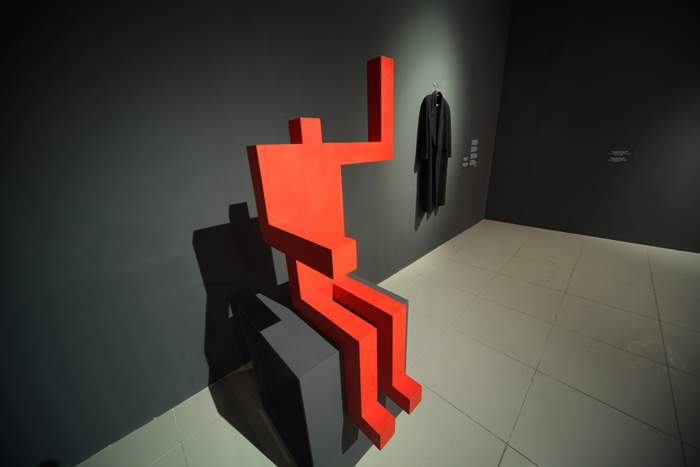
A sculpture at Perm's museum of contemporary art
“It was a project to change life in the city,” says curator Marat Gelman, who was brought in specially from Moscow. Always provocative, it seems that in 2012 his exhibitions were too political and went too far. He was sacked.
“It all finished very quickly when Mr Putin decided to be president again,” the curator argues. “At the beginning Putin was a person who said we go to Europe, we think about the future. But Putin today is a totally different figure. He said forget about modernisation, we’re going back to traditional things.”
The “P” sculpture itself survived. So did Perm’s museum of contemporary art - PERMM - the only one of its kind outside Moscow. A former member of Gelman’s team now runs it.
“There was a point when Perm was beginning to feel like a Russian New York, attracting all the best producers, curators and projects,” the museum’s new head, Nadia Allahverdiyeva remembers.
She recalls this city full of creative energy, hosting multiple festivals and shows and well-known guests from abroad. Perm is where Chekhov is said to have imagined his Three Sisters in the provinces, yearning for Moscow. As modern-day Perm filled up with art, so the real-life young stopped pining to leave. Looking back, the curator recalls a thrilling moment. But now the museum’s wings have been severely clipped and she has to be careful.
“The vulnerability of the museum now creates internal censorship in my head. The most important thing is to maintain the institution.”
“We do nothing to damage our reputation for art,” the curator insists, acknowledging that state funding is key to the museum’s survival. “But we do lower the temperature. It’s a compromise.”
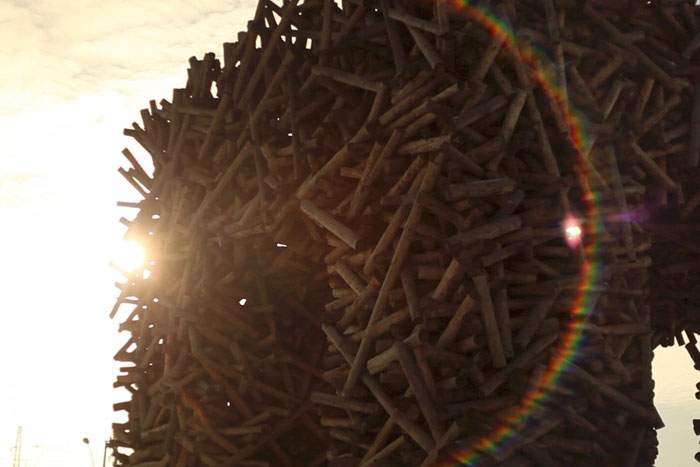
Forced compromise is a product of the shifting climate across Russia. Being open, challenging and modern - all are firmly out of fashion. They’ve been ousted by isolation, control and tradition.
There are plenty of people who don’t share that vision. But over his last term in office their president has pivoted Russia away from the West and its values and on to a “Russian” path.
The direction for the next six years seems fixed.
